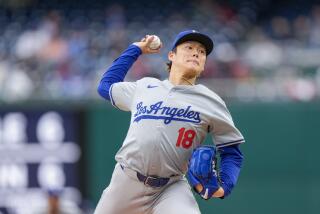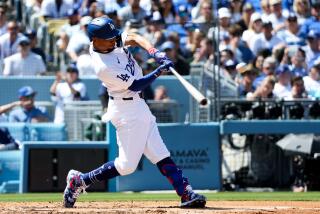After Closing Blue Book, Karros Faces a New Test
The December trade brought an unceremonious conclusion to his 11-plus seasons as the Dodgers’ first baseman, a stint in which he became the Los Angeles franchise record holder for home runs while ranking second in extra-base hits and fourth in games played.
Eric Karros will leave his Manhattan Beach home next week to join the Chicago Cubs at their training base in Mesa, Ariz., the first time in his 15-year professional career he has gone anywhere except Vero Beach for spring drills.
Baggage?
Over lunch at a South Bay restaurant Thursday, Karros insisted that he won’t be carrying any, that he is not packing any bitterness regarding the way it played out with the Dodgers.
“There is nothing to be gained by pointing fingers and making excuses,” he said. “I have a friend who owns a company called Final Cause. In this situation, I was the final cause.
“If I’d had the type years that were expected of me the last two years, I wouldn’t have been traded, there wouldn’t be a story, we wouldn’t be sitting here talking about it.”
We were talking about the trade in which the Dodgers, eager to free up payroll and positions, sent Karros and second baseman Mark Grudzielanek to the similarly eager Cubs for catcher Todd Hundley and outfielder Chad Hermanson.
We were talking, as well, about the uncertainty confronting Karros this spring as he tries, at 34, to come back from the disappointment of the last two seasons while battling for a starting job against the power and promise of 23-year-old Hee Seop Choi, of whom Karros said:
“All I know is that he’s about 6 foot 5, 240 pounds and Korean. If I’m better than he is, I’ll play. If he’s better than I am, he’ll play. I have no problems with that.
“At least, unless something unforeseeable happens, I think there might be a platoon situation to start the season, but I don’t think anyone knows right now.”
Choi slugged 29 homers and drove in 97 runs in triple A last year but also struck out 119 times in 478 at-bats.
“We hope he’s ready,” General Manager Jim Hendry said by phone. “You want your best young players to play, but he has to earn it. We’re not in the developmental business at the major league level.”
The situation is not without irony.
Consider that Karros will have a shot at playing first base for a team whose 2002 first baseman, Fred McGriff, will be his replacement in L.A., where the Dodgers felt it imperative to improve on the 28 home runs Karros totaled in the last two seasons. The 39-year-old McGriff slugged 30 homers and drove in 103 runs last season alone, but he wasn’t even offered salary arbitration by the Cubs, who privately rapped his defense, felt much of that power came late in the season in meaningless games and believed it was time to give Choi a chance.
Karros, of course, provides a veteran option for new Manager Dusty Baker, who, as Hendry said, “has a way of getting mileage out of players who appear to be at the tail end of their career. There’s no way anyone thought Benito Santiago would drive in 74 runs and bat fifth behind Jeff Kent and Barry Bonds [as he did in San Francisco last year]. The one thing Dusty and I wanted to attack was our total depth and not worry about who started. Karros has had a great career. If his health is better, we should have two first basemen who each figure to get plenty of at-bats.”
The tandem of Karros and Baker represents another irony given their years of heated rivalry as Dodger player and Giant manager. At this point, Karros said, the only thing his new manager has told him is, “Come in ready to play, you’re going to get an opportunity, you’re going to have at-bats. Whether that’s 500 or 200, he doesn’t know and I don’t know, but if you look at Dusty historically, everybody is going to play.”
That could be a positive for Karros, providing he improves on his career-low 13 homers of last year. He hit only four in the second half while coping with a left shoulder injury that required October surgery -- an injury he was aware of before the 2002 season started but chose not to have repaired at that point because he was also rehabilitating the back injury that had impaired his 2001 production of 15 homers and a .235 average.
Karros said he has addressed the physical issues as best he can.
“I have to be realistic,” he said. “Maybe time is catching up. On the other hand, I’ve put myself in a good position [physically] and believe I can still play at a higher level than I did in the last two years, and that’s the only motivation I need. I have nothing to prove to the Dodgers. I only have something to prove to myself. If some people don’t believe I can do it, I can respect that, given the last two years. If I don’t do better, maybe I’ll give the glove to [Grudzielanek] and let him play first.”
For Karros, his decade of accomplishment in Los Angeles was clouded at the end by those two poor seasons and a perception that he and Grudzielanek were the players who most often questioned their roles under Manager Jim Tracy, a perception that took on weight, Karros admits, when Tracy didn’t call him until four or five days after the trade and General Manager Dan Evans, with Karros having just undergone shoulder surgery, chose that delicate time to publicly put the first baseman on the trade block.
The past is past, and Karros said he will “never say anything derogatory about an organization that gave me an opportunity to live a life I never would have dreamed of, both professionally and economically. How can I complain about that? I mean, I can get emotional about certain things. But when I step back and remove that emotion, I had a great experience in L.A. That’s not to say that over the years there weren’t times when there were frustrations and disagreements, but that happens in any walk of life. If anybody thinks otherwise, they must be living in a utopian dream world.”
The cursed Cubs could never be mistaken for utopia, but Karros insisted he is excited about the new opportunity at a propitious time in his career, the chance to play in another great city under a respected and credible manager, and that he is embracing it with an open mind, as Mike Piazza advised. Any other place, Karros suggested, and he might have blocked the trade, exercising his rights as a player with 10 years in the majors and the last five with the same club, but he kept a promise to Dodger Chairman Bob Daly -- made at the time of his last contract signing -- that he would waive those rights if traded.
“If it had come down to a situation where I wasn’t going to have the opportunity or chance to succeed, I don’t know what would have happened,” he said.
Now, two months later, he knows there will be an emotional jolt when he puts on the uniform for the first time “and I look down and it says Cubs instead of Dodgers” but he has basically come to grips with the emotion, having adjusted to the reality that few players spend their entire careers with the same club.
Of course, he added, the fact that the continuity he knew during the first half of his career with the Dodgers gave way to turmoil the last five years eased his acceptance of the trade.
“I’d probably feel a lot differently if Peter O’Malley was still the owner and Fred Claire was still the general manager and Tommy [Lasorda] was still the manager, if I’d had the same relationship with the same group for 11 or 12 years,” Karros said. “But there’s been so many changes from year to year that there hasn’t been a lot of stability recently, and if it now seems they’re headed in a better direction that way, who knows? If the team is up for sale and somebody is going to spend $650 million, it’s foolish to think they’re not going to make their own decisions and bring in their own people.”
Who knows, indeed?
The one certainty is that Eric Karros will be packing up and watching from a distance.
More to Read
Are you a true-blue fan?
Get our Dodgers Dugout newsletter for insights, news and much more.
You may occasionally receive promotional content from the Los Angeles Times.






